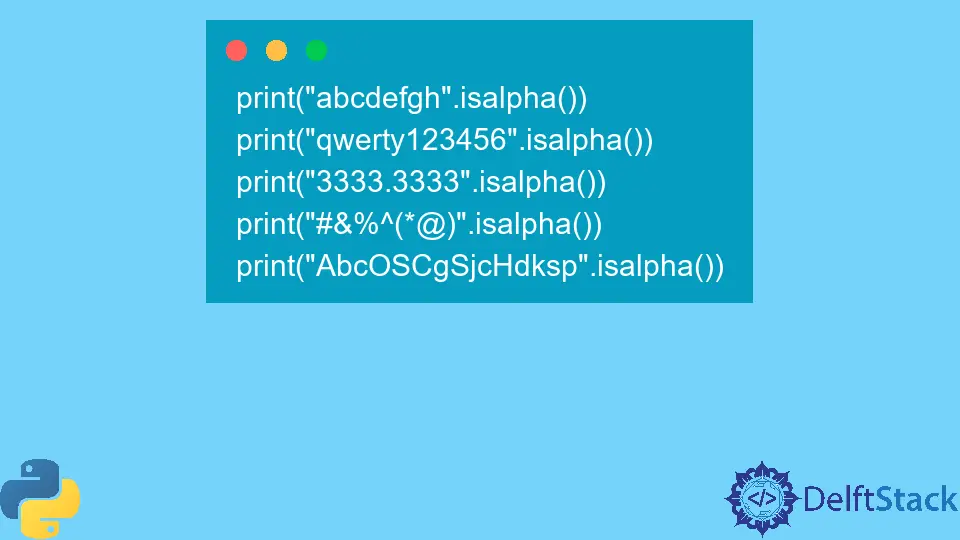isalpha() in Python
- What is the isalpha() Method?
- Example 1: Basic Usage of isalpha()
- Example 2: Digits and Special Characters
- Example 3: Empty Strings and Edge Cases
- Conclusion
- FAQ

When working with strings in Python, it’s essential to know how to validate the content of those strings. One of the handy built-in methods for this purpose is the isalpha() method. This method checks whether all characters in a string are alphabetic.
In this article, we’ll dive deep into the isalpha() method, explore its syntax, and provide practical examples to illustrate how it works. Whether you’re a beginner or looking to refresh your knowledge, this guide will help you understand how to use isalpha() effectively in your Python projects.
What is the isalpha() Method?
The isalpha() method is a string method that returns True if all characters in the string are alphabetic and there is at least one character; otherwise, it returns False. This method is particularly useful when you want to ensure that input consists solely of letters, such as when validating user input in forms.
The syntax for using isalpha() is straightforward:
string.isalpha()
Here, string is the string you want to check. Let’s look at some examples to clarify how it works.
Example 1: Basic Usage of isalpha()
In this example, we will check a simple string to see if it contains only alphabetic characters.
text = "HelloWorld"
result = text.isalpha()
print(result)
Output:
True
In this case, the string “HelloWorld” consists entirely of alphabetic characters. Therefore, the isalpha() method returns True.
Now, let’s consider another example where the string contains spaces.
text_with_space = "Hello World"
result_with_space = text_with_space.isalpha()
print(result_with_space)
Output:
False
Here, the string “Hello World” contains a space, which is not an alphabetic character. As a result, isalpha() returns False. This illustrates how isalpha() strictly checks for alphabetic characters, meaning that any non-alphabetic character will lead to a False return value.
Example 2: Digits and Special Characters
To further understand the behavior of isalpha(), let’s test a string containing digits and special characters.
text_with_digits = "Python3"
result_with_digits = text_with_digits.isalpha()
print(result_with_digits)
Output:
False
In this example, the string “Python3” includes a digit (‘3’), which causes isalpha() to return False. This highlights the importance of using isalpha() when you need to ensure that strings are purely alphabetic.
Let’s examine a string with special characters:
text_with_special = "Python@2023"
result_with_special = text_with_special.isalpha()
print(result_with_special)
Output:
False
The presence of the special character ‘@’ also leads to a False return value. This reinforces the idea that isalpha() is strict about the types of characters it considers valid.
Example 3: Empty Strings and Edge Cases
Now, let’s explore how isalpha() behaves with edge cases, such as an empty string.
empty_string = ""
result_empty = empty_string.isalpha()
print(result_empty)
Output:
False
An empty string returns False because there are no characters to check. This is an important aspect to remember when using isalpha() in your code.
Next, let’s check a string that contains only whitespace characters.
whitespace_string = " "
result_whitespace = whitespace_string.isalpha()
print(result_whitespace)
Output:
False
The string containing only spaces also returns False. This demonstrates that isalpha() does not consider whitespace characters as alphabetic.
Conclusion
The isalpha() method in Python is a powerful tool for validating string content. It ensures that a string contains only alphabetic characters, which can be crucial in various applications, such as user input validation. Through our examples, we’ve seen how isalpha() behaves with different types of strings, including those with spaces, digits, special characters, and even empty strings. By understanding how to use this method effectively, you can improve the robustness of your Python programs.
FAQ
-
What does the isalpha() method do?
The isalpha() method checks if all characters in a string are alphabetic and returns True if they are, otherwise it returns False. -
Can isalpha() handle strings with spaces?
No, isalpha() returns False if the string contains any spaces. -
What will isalpha() return for an empty string?
isalpha() will return False for an empty string since there are no alphabetic characters present. -
Does isalpha() consider special characters?
No, isalpha() will return False if the string contains any special characters. -
Can I use isalpha() on strings with mixed characters?
No, isalpha() will return False for strings that contain a mix of alphabetic characters and non-alphabetic characters.
